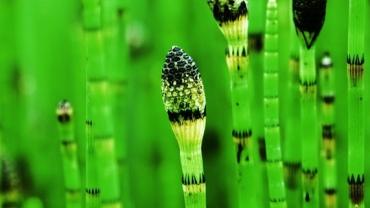
Horsetail extract – such a strange (and misleading) name for a botanical but don’t let that fool you; this compound does not come from horses! Several species of Equisetum the horsetail genus are employed in supplements the most common of which is Equisetum arvense. The name Equisetum comes from the Latin equus for “horse” and seta meaning “bristle.” It was so named because as the plant dries silica crystals accumulate in the stems and branches which look like feathery tails and give the plant a scratchy quality. The aboveground parts of horsetail as opposed to the roots are used for medicinal purposes and they may be fresh or dried and delivered in capsules or as tinctures or teas.
Horsetail contains the largest silica content in the plant kingdom. Because of this horsetail may be beneficial for strengthening nails and hair as well as skin and other collagen-rich connective tissue. It has been used to help combat osteoporosis as it may help improve bone mineral density. There is not an abundance of studies on this but horsetail does have efficacy in inhibiting the synthesis of human osteoclasts in vitro. Horsetail showed a dose-dependent inhibitory effect on osteoclastogenesis that reached statistical significance at a concentration ≥0.004 mg/ml. Researchers concluded that horsetail modulated osteoclast formation by either acting directly on osteoclast precursor cells or indirectly via osteoblasts.
A more deeply studied property of horsetail is its diuretic effect. In a study that evaluated the diuretic potency of various species of horsetail E. hiemale var. affine was shown to have similar efficacy to hydrochlorothiazide in mice. Studies in humans also support a diuretic role for horsetail. In healthy young men horsetail extract (900mg/day) showed similar effects to hydrochlorothiazide (25mg/day) and significantly greater effects than corn starch (900mg/day) which was used as a placebo. This study had a host of weaknesses one of which is that researchers relied on the subjects to track all of their fluid intake and output for four days each during three separate crossover phases: one with hydrochlorothiazide one with horsetail and one with placebo. Subjects were also expected to take the experimental capsules three times per day for a total of twelve days of taking the capsules and recording fluid intake and output with ten-day washout periods in between each arm of the crossover. These factors do not negate the findings but the findings should be interpreted cautiously. Overall the diuretic effect of horsetail was comparable to that of hydrochlorothiazide and horsetail had no significant effect on the urinary excretion of electrolytes and catabolites. No adverse effects were noted in liver kidney or hematological function indicating that horsetail is safe at least for short-term use. Perhaps better designed studies can corroborate these findings. It should be noted though that horsetail is effective enough as a diuretic that it is approved in Germany as an oral diuretic for the treatment of edema.
Research on horsetail in general is not as abundant as seen with other botanicals. Other areas with potential for further exploration of the biochemical effects of horsetail include diabetes and blood sugar control and pain management and wound healing. Horsetail essential oil has shown antimicrobial activity against a variety of pathogenic organisms such as Staphylococcus aureus E. coli and Candida albicans.
Like any botanical supplement horsetail extract is not without risks. According to the University of Maryland Medical Center’s Complementary and Alternative Medicine Guide horsetail is generally considered safe but there are some population groups that should use caution when taking horsetail: